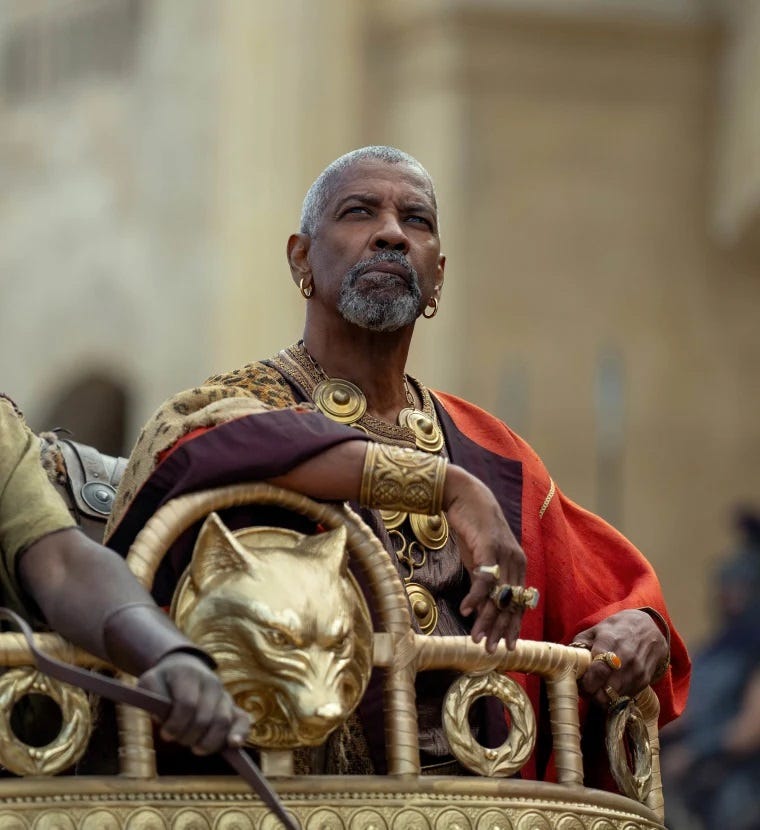According to the folk wisdom of social media, men think about Rome on the regular. Gladiator 2 no doubt made that more common. After all, men dominated the Regal auditorium in which I watched the film. But Gladiator 2 showed us, and every other audience, a Rome that we’re not used to. In Gladiator 2, Rome stinks. It’s savage. It’s hazy, dusty, dirty — and drowning in opulence.
By delving into Rome’s darker side in this way, the film shows how, when the elite hoard wealth and resources, unrest will grow until it erupts into insurrection. And as Ridley Scott depicts this Rome infected by avarice, he gestures at America saying, “see what awaits you should your basest impulses be your guide?”
For, remember. Before Rome was an Empire, she was a Republic.
(Spoilers follow.)
Gladiator 2 opens with a set piece that inverts the original’s. Instead of a general fighting for the honor and glory of Rome against a barbarian horde, Hanno appears — a farmer and militiaman who wishes to sacrifice Roman soldiers in defense of what he calls “the last free city in Africa Nova.”
“They have no lands save the ones they’ve stolen,” Hanno says as the Roman fleet approaches. And with that, the film lobs its first volley at America’s many imitations of Rome.
After all, what lands belong to America that it has not taken by force or purchased from other thieves? From sea to shining sea, every acre is stolen. Generations of colonists, settlers, frontiersmen, and homesteaders called Indigenous peoples “savages” to justify theft and genocide. Like Rome before her, America premised her conquest on a story of superiority, and a dream.
“The dream that once was Rome” is a refrain repeated throughout Gladiator 2, referencing Marcus Aurelius’s dying wish in the original film: that the people, not emperors, would rule Rome. The phrase also evokes the American Dream. The dream that said anyone can make it here if they play the game well enough. Denzel Washington’s character, Macronus, portrays the parallel.
In real life, Macronus ruled the empire after Caraculla and Geta, the twin brothers whose brief and tumultuous period of co-rule is the historical setting for the film. The historic Macronus, born to a peasant family of Berbers in the provinces of North Africa, was the first and only Roman emperor who was not a Patrician by birth.
In the film, Macronus is a fashionable man of cunning and wealth on the last leg of his journey to power and influence. Reportedly in search of a seat on the Senate, it appears Macronus intends to use the gladiators he owns, including the war prisoner Hanno, to accomplish this. By indulging the bloodlust of Geta and Caraculla, Macronus earns the confidence of the emperors, and he uses this newfound trust to turn one against the other. When Geta then kills Caraculla, Macronus is named Consul of Rome.
“Where else but Rome could such a story be possible?” Macronus says.
Indeed, only the treachery, greed, and subterfuge that rule Rome make Macronus’s story possible. Similarly, countless American stories — including those of men like Elon Musk and Donald Trump — would never be possible if bad behavior went unrewarded.
Yet, while some chase wealth and power for their own sake, the fictional Macronus is motivated by vengeance. Macronus desires revenge against the memory of Marcus Aurelius. To do so, Macronus plans to topple the empire. Rome’s worst impulses have made such a task simple. As the elites amassed their fortunes and engaged their armies in endless military campaigns, anger had kindled in the hearts of every citizen. Civil war was in the offing.
“Rome is ready to fall,” Macronus says. “I need only give her a push.”
As computational historian Peter Turchin points out in his book End Times, America’s position is precarious too. January 6th revealed that. So did the second election of Donald Trump. As did the targeted killing of the United Healthcare CEO.
But as unrest rises in our nation, we cannot expect the neat resolutions of a Hollywood fable to save us. In Gladiator 2, Hanno reveals himself to be the long-lost grandson of Marcus Aurelius and leads a revolt. He then seizes power from Macronus, preempting civil war through single combat and an inspiring speech.
No such salvation awaits America.
Arresting our descent into autocracy will take time, patience, a tolerance for discomfort, and the work of thousands. If the dispossessed are to one day rule America, then the idea that the people need strong, charismatic leaders to guide us must be abandoned. Though, as one of the senators says in the film, “politics follows power,” no one person can ever hold more power than a people united.
For Americans, then, the task is to unify, to decide for ourselves what America’s dreams will be. But this demands the tedious, uncinematic work of organizing people, of building deep communal bonds one day, one action at a time. Only then will America have a meaningful democracy — something Rome never accomplished.





